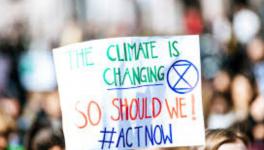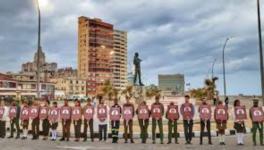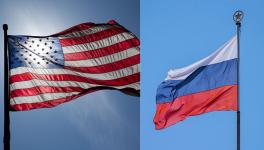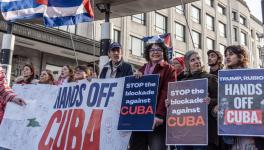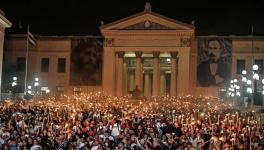Russia, China Keep the ‘Dragon in the Fog’
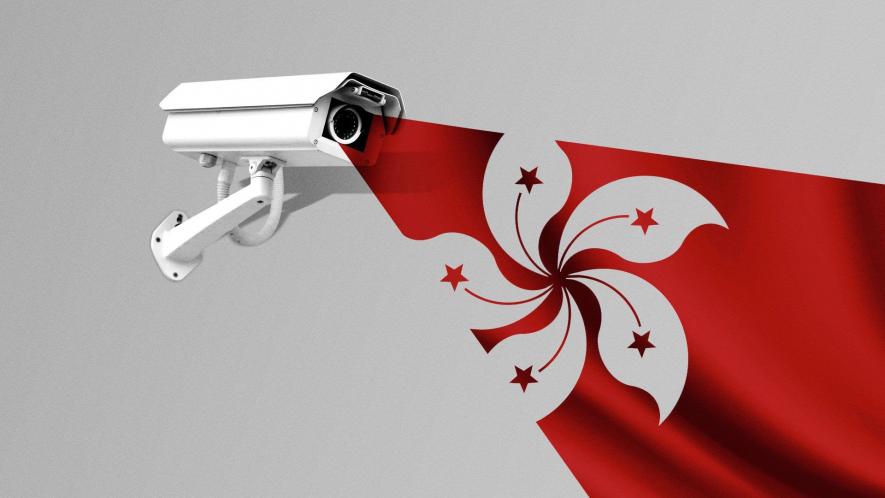
Chinese President Xi Jinping said in a phone conversation on Wednesday with his Russian counterpart Vladimir Putin that Beijing will “continue to work” with Moscow in “firmly supporting” each other’s efforts “rejecting external sabotage and intervention” so as to “preserve their respective sovereignty, security and development rights, and well safeguard their shared interests”.
This signifies the consolidation of a new template in the Russian-Chinese alliance, which appeared in the most recent months — mutual support to push back at the covert operations by Western intelligence agencies to destabilise the internal situation in the two countries.
A quasi-alliance rooted in dynamic economic partnership — trade touched $110 bn last year — and intensifying cooperation and coordination in the foreign policy arena takes a big leap forward, as the two countries join hands to strengthen their political systems. Beijing’s interest to highlight it speaks for itself.
Xi’s phone call to Putin took place in the backdrop of the Russian constitutional referendum and the law on ensuring security in Hong Kong last week. Prima facie, one metaphor is common to them — the “dragon in the fog”, a Chinese concept to portray a strong player in an incomprehensible space who can strike at his competitors at any moment from an unexpected angle.
The metaphor was recently used by a Russian political analyst Alexey Chesnakov (who previously served as a Kremlin aide) to sum up the quintessence of the Russian referendum, which allows Putin notionally to seek two more six-year terms. As Chesnakov put it, President Putin “wants to remain a ‘dragon in the fog’ until the end of his presidency”.
Chesnakov explained that the sheer prospect of Putin remaining in power beyond 2024 would also send an unmistakable signal to the international community that the Russian leader is confident about remaining at the helm of affairs in his country for at least the next decade.
Coming to the Hong Kong legislation too, the leitmotif is the ‘dragon in the fog’. The new law strengthens China’s national unity and territorial integrity. The four categories of criminal offence outlined in the law are: secession, subversion of state power, terrorist activities, and collusion with foreign and external forces to endanger national security. In essence, the legislation will keep Western intelligence guessing.
The Western legal scholars’ principal argument is that the new law weakens the “one country, two systems” principle. But the paradox here is that while Western critics put the accent on the “two-systems” part, Beijing estimates that it is the “one-country” leg that has dramatically weakened in recent years due to the upheaval in Hong Kong.
Beijing had two options to bring about greater harmony — use of force to pull back the “two systems” concept from racing away or, alternatively, strengthen the “one country” part by providing security underpinnings. Beijing opted for the latter course after a great deal of deliberation.
The crux of the matter is that Beijing wants to keep Hong Kong as the financial hub of Asia, while at the same time strengthening the city’s security and stability. Of course, the interference of the Western intelligence agencies — primarily British, Australian, and American intelligence — to fuel the protests in Hong Kong formed the context.
Hong Kong has a long history of being the base camp of Western intelligence agencies in the Asia-Pacific. Much has been written about the Western intelligence agencies’ covert operations out of Hong Kong before, during, and after the 1989 Tiananmen Square protests in China.
In the case of Russia, too, Western intelligence activities are showing signs of making another determined push for a post-Putin scenario in the Kremlin. The West’s calculation is that if Putin were to step down in 2024, he would very soon become a “lame duck”. Like in Hong Kong, Western intelligence has developed extensive networks within Russia through which it is feasible to fuel unrest if political uncertainties coalesce with social and economic grievances. The Russian counter-intelligence is very well aware of this danger.
Also read: China India Disconnected? The App Ban and Beyond
Putin has outwitted the Western game plan to destabilise Russia. The constitutional amendment allows him to seek another two six-year terms and he intends to keep everyone guessing. Keeping the Western adversaries guessing is also what the Chinese security law in Hong Kong hopes to achieve.
The Western intelligence operating out of the city henceforth comes under the direct scrutiny of Beijing. Recruitment of local agents, planning and mounting operations inside China, or inciting unrest in Hong Kong to weaken China — such covert operations become far more difficult and risky for the US, British, and Australian intelligence. Interestingly, Xi used the expression “external sabotage and intervention” in his conversation with Putin today.
Beijing and Moscow have voiced strong support for each other’s moves to strengthen national security. On June 2, Chinese foreign ministry spokesman Zhao Lijian said, “We note that the national referendum on constitutional amendments, a major event in Russia’s political calendar, is going on smoothly. Results released by the Central Elections Commission reflect the Russian people’s choice. As Russia’s friendly neighbour and comprehensive strategic partner of coordination for a new era, China will always respect the development path independently chosen by the Russian people and support Russia’s efforts to realise lasting stability and promote socioeconomic development.”
“We stand ready to work together with the Russian side to act on the consensus reached by our heads of state, deepen all-round strategic coordination and mutually-beneficial cooperation in various areas, and bring greater benefits to our two peoples.”
On the same day, Russian Foreign Ministry spokesperson Maria Zakharova said in Moscow, “We noted the entry into force of the law on ensuring national security in the Hong Kong Special Administrative Region of the PRC on July 1, 2020, by the decision of the Standing Committee of the National People’s Congress of China.
“In this context, we would like to reaffirm that Russia’s position of principle on the situation in Hong Kong remains unchanged. We respect the sovereignty and territorial integrity of the PRC and consider all issues pertaining to Hong Kong to be China’s domestic affair. We are against any attempts by external forces to interfere in relations between the central government and the Hong Kong Special Administrative Region of the PRC.”
Cooperation between the Russian and Chinese security agencies in the realm of internal security can only stem from a high level of mutual understanding. Significantly, on July 4, Russian Deputy Foreign Minister Sergei Ryabkov poured cold water on President Trump’s invitation to Putin to attend a G7 summit in the US, calling it a “flawed” idea.
Moscow has any number of legitimate reasons to distance itself from Trump’s invite, but what Ryabkov chose was very telling. He said, “The idea of the so-called expanded G7 summit is flawed, because it is unclear to us how the authors of that initiative plan to consider the Chinese factor. Without China, it is just impossible to discuss certain issues in the modern world.”
In effect, Rybakov thwarted Washington’s move to isolate China. Trump’s advisors were naive to estimate that Moscow could be baited to join its containment strategy against China. Ryabkov publicly administered the Kremlin’s snub.
Get the latest reports & analysis with people's perspective on Protests, movements & deep analytical videos, discussions of the current affairs in your Telegram app. Subscribe to NewsClick's Telegram channel & get Real-Time updates on stories, as they get published on our website.









